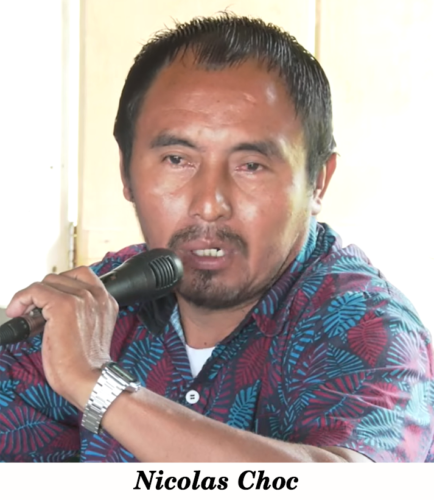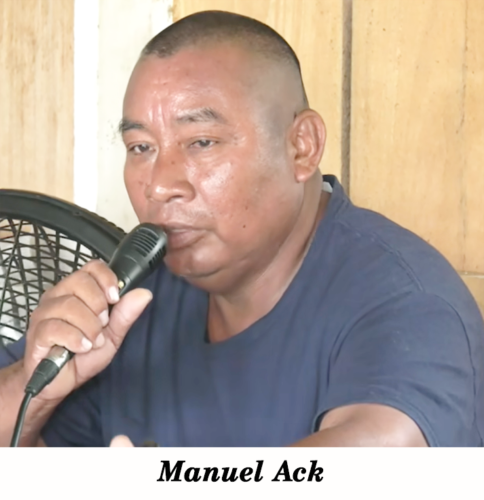Villagers are torn and confused about the leadership of the Maya community
by Marco Lopez
BELIZE CITY, Thurs. Aug. 22, 2024
A legal limbo is widening rifts in the Maya community of Indian Creek, located on the Southern Highway in Toledo District, Belize. The community of approximately 1,500 residents is faced with the challenge of finding a middle ground between the traditional system of governance – enforced by the 2015 Caribbean Court of Justice (CCJ) ruling – and the contemporary village council system, governed by the Village Council Act.
On Tuesday, August 20, members of the village council and a handful of villagers called a press conference to reiterate their decision to remove the previous alcalde, Jose Choc, and his deputy, Felipe Sam, which took place in November 2023.

They noted that those differences between the removed alcalde and the village council had fettered development within the community. The Attorney General’s Ministry, in January 2024, finalized the recommended removal of the alcalde by appointing Manuel Ack and Nicolas Choc as replacements for the removed alcalde and his deputy.

But the Maya Leaders Alliance (MLA) and the Toledo Alcalde Association (TAA), following that decision by the AG’s ministry, filed an injunction in the High Court of Belize to bar the replacements from partaking in any form of traditional leadership in the village. This injunction was granted.
At this week’s press conference, villagers commented that following the replacement of the former alcalde, the new alcalde and the village council have been working together in unison, to drive development within the village. But on August 15, the AG’s Ministry sent a letter to the village citing the civil suit by the TAA and an injunction that reinstates the removed alcalde and his deputy until that matter is finalized.
This has caused a lacuna in the leadership of the village, with villagers on opposing sides choosing their respective leaders. Whether the previous village leaders, Choc and Sam, will be permanently reinstated, will be determined by the court through its ruling on the judicial review application filed by the TAA.
Attorney for the Government of Belize in this case, Andrew Marshalleck, SC, shared in June that this issue is one that has festered for decades within the governance systems in Toledo. The introduction of the 2015 CCJ Consent Order, the resulting need to enact reform legislation governing Maya customary land rights, and the discord in Indian Creek have put a spotlight on the divide between alcalde and village council systems.
In recent comments, Marshalleck said, “These little issues have been festering for decades because of our history. It’s not a new thing. It’s not something this government has done. It’s a problem they have with the way we have sought to impose our system of government on them. It is slated to be included as part of the laws governing Maya customary land rights. This is scheduled to be dealt with as part and parcel of the Maya land rights legislation. It is part of it. And the policy says that the government will devise the laws so as to harmonize the two systems as far as possible, and harmonizing it might well mean putting one in its place so that you understand your hierarchy.”
In Indian Creek, that hope for harmony between the two systems has been overcasted by claims that the previous alcalde was fettering the development needed within the village. Avelina Coc, chairlady of Indian Creek Maya Arts Women’s Group told local media that the previous alcalde rejected the installation of infrastructure needed to improve digital connectivity, in a signed letter issued without the villagers’ consent.
That letter found its way back to the village council, which prompted the removal of the MLA/TAA-supported alcalde.
While ideological disagreements as to what constitutes traditional and customary practices also present an additional hurdle, the desire expressed by both parties is to marry the way of life practiced over centuries with the need to develop communities by implementing projects and programs that complement, without imposing on, Maya customs.
Anselmo Cholom, a resident of Indian Creek and member of the village council, said during the press conference, “We’re not saying that we want to give up our tradition or move from the communal land system. But the people, the people that are leading the Mayan people are dividing us in a way where they did not respect the decision of the community. I practice traditions. That doesn’t mean that I cannot do it. Get development. That doesn’t mean that I cannot get a concrete building. And if we have to get out of a communal system because of that, then we have to change.”
The leader of the MLA has gone on the record to say the MLA supports progress and development in congruence with the Maya people’s standards.
Reports are that the new alcalde was recommended directly by the village council to the AG’s ministry, instead of the decision/selection being made by the majority of villagers, as has been the practice. This claim has been denied by Indian Creek village council members and the embattled alcalde.

